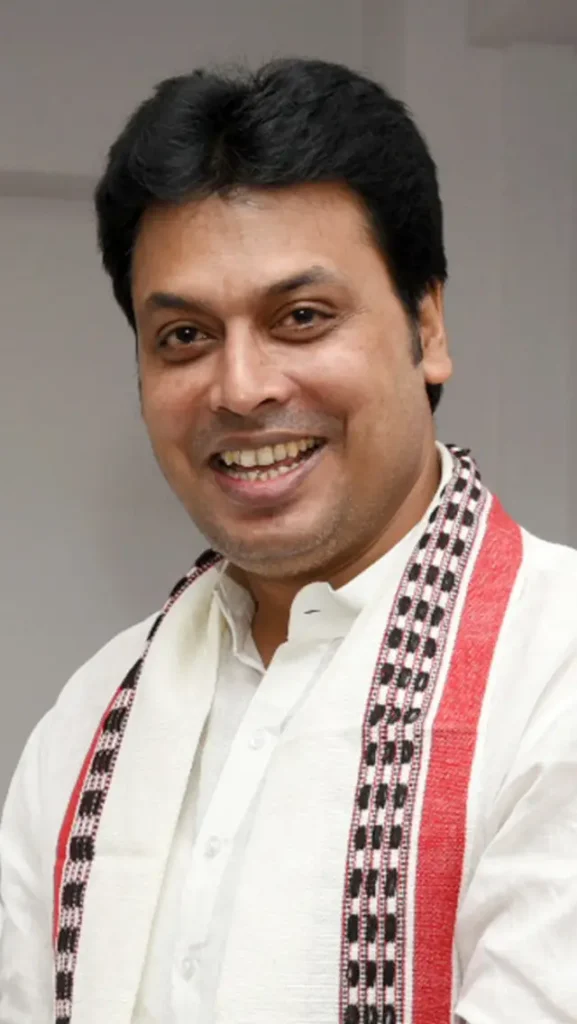Tripura’s Ex-CM Biplab Deb Comments on New CPI(M) Chief M A Baby

“Never Heard of Him”: Biplab Deb’s Comment on M A Baby Sparks Political Buzz
Tripura, April 8, 2025 – Former Tripura Chief Minister and current BJP MP Biplab Kumar Deb has once again found himself at the center of political attention. This time, it wasn’t a formal policy statement but a candid comment that stirred up a nationwide conversation. Reacting to the appointment of M A Baby as the new General Secretary of the CPI(M), Deb openly admitted he didn’t know who the leader was.
“I don’t know him personally. I’ve heard he’s from Kerala, but I’ll have to Google him,” Deb remarked casually during an interaction with journalists in Agartala.
Although the setting was informal—a cultural program at Rabindra Shatabarshiki Bhawan—the comment quickly gained traction. It didn’t take long before the clip went viral, setting social media platforms abuzz and sparking debates across political lines.
Biplab Deb on M A Baby Becoming CPI(M) General Secretary
Within hours, hashtags like #BiplabDeb and #MABaby began trending. Supporters of the BJP hailed Deb’s honesty, interpreting his words as a reflection of the CPI(M)’s diminishing national profile. Meanwhile, critics questioned how a seasoned politician could be unaware of a figure like M A Baby, who has held important roles in Kerala politics for decades.
Despite varying opinions, one thing was clear—the statement had struck a chord.
Ex-Tripura CM makes a candid statement about the new CPI(M) head
While M A Baby might not be a household name across India, within Kerala and among Left circles.He has previously served as Kerala’s Education Minister, earning respect for his intellectual depth and ideological commitment. Known for his disciplined approach to Marxist principles, Baby has been a pillar within the CPI(M)’s internal structure for years.
Yet, outside Kerala, his public presence remains minimal. It’s precisely this lack of broader visibility that likely led to Deb’s eyebrow-raising comment.
The Core Message: Visibility Matters
Although Deb’s tone was informal, his comment hinted at a more strategic message: visibility equals political relevance. According to Deb, for any political leader to truly matter in today’s interconnected age, they must be widely recognized.
“People feel connected to leaders they’ve heard of. Without visibility, trust becomes harder to build,” Deb told reporters.
Whether it was a calculated move or an honest oversight, Deb’s statement reflected the growing emphasis on media presence and digital recognition in modern Indian politics.
Was It Just a Dig—Or a Political Strategy?
Political analysts believe there’s more to this remark than meets the eye. Deb has long positioned himself as a vocal opponent of the Left, especially given his role in ending CPI(M)’s 25-year rule in Tripura. By highlighting the relatively obscure status of the new CPI(M) chief, he may have been reinforcing the BJP’s narrative of the Left’s declining national stature.
Moreover, he emphasized the visibility of BJP’s own leaders.
“Modiji, Amit Shahji, Yogi Adityanathji—everyone knows them. That’s the kind of leadership people resonate with,” Deb said confidently.
This comparison, though indirect, underscored the BJP’s branding strategy, which leans heavily on charismatic and media-savvy leadership.
CPI(M) Responds—Softly
As the comment gained momentum, CPI(M)’s official response remained subdued. However, insiders close to the party offered quiet rebuttals. One senior leader from Kerala, speaking off the record, defended M A Baby’s credentials.
“He might not chase the spotlight, but M A Baby has spent decades strengthening the party from within. Leadership should be about contribution, not popularity,” the leader remarked.
Such statements reflect the CPI(M)’s traditional focus on ideology over image, a stark contrast to the BJP’s media-forward approach.
Local Rivalry with National Implications
It’s worth noting that Deb’s rivalry with the CPI(M) isn’t just political—it’s personal and historic. His ascent in Tripura politics came on the back of a strong anti-Left wave. Therefore, it’s unsurprising that he continues to challenge the CPI(M)’s decisions, even when they pertain to leaders from distant states like Kerala.
In this light, his comment on M A Baby seems like a continuation of his ideological battle rather than an isolated jibe.
More Than Just a One-Liner
Interestingly, Deb didn’t limit his comments to M A Baby. He went on to speak about “One Nation, One Election,” a key BJP talking point.
“After independence, elections across states and the center used to happen together. Congress disrupted that system by misusing Article 356,” he said.
He argued that bringing back simultaneous elections would not only enhance efficiency but also reduce the financial burden on the exchequer.
This shift in tone turned a casual media chat into a broader political commentary, blending critique with party narrative.
What Defines Leadership in 2025?
The episode raises deeper questions about the nature of leadership in contemporary Indian politics. Do voters value experience and ideology, or are they swayed by charisma and visibility? Is a leader’s strength measured by policy impact or by their social media following?
In an era driven by 24/7 news cycles and viral moments, political identity often hinges on public image. Parties are increasingly aware that perception can be as critical as performance.
Conclusion: A Soundbite That Sparked a Storm
What started as an off-the-cuff comment has evolved into a nationwide debate about leadership, recognition, and political branding. Whether Biplab Deb intended it or not, his remarks have spotlighted the CPI(M)’s internal challenges in connecting with a national audience.
As for M A Baby, his leadership will now unfold under public scrutiny. Whether he chooses to respond with silence or with substance, his actions will likely speak louder than any hashtag.






